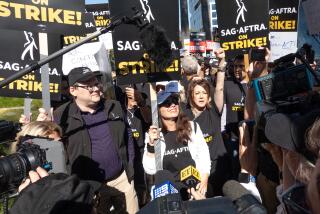TV Strike Deadline Might Be Extended
Negotiations to avert a strike that could delay the start of the fall television season continued into the night Wednesday.
Representatives of the Screen Actors Guild (SAG) and the American Federation of Television and Radio Artists (AFTRA) earlier this week set a target deadline of midnight Wednesday for concluding talks on a new three-year contract with the Alliance of Motion Picture and Television Producers.
But on Wednesday neither side ruled out the possibility of extending the talks if progress were being made.
A strike would interrupt filming of feature films and prime-time television series, which already are in production for the fall season. It would not affect daytime soap operas, television news, radio shows or the filming of commercials, which are covered by other contracts.
Approval for Strike
Earlier this week, SAG and AFTRA, which bargain jointly for 92,000 actors, singers, dancers and stunt people, announced that they had gotten overwhelming approval from their members to call a strike if necessary.
The presidents of both unions said they hope to avoid a strike. But they said a walkout would be called unless the producers backed off on some of their demands to âroll backâ residual payments. Actress Patty Duke, president of SAG, said some of managementâs demands were âunthinkable.â
On Wednesday, spokespersons for both sides took a cautiously optimistic approach.
âThe parties resumed negotiations this morning and have been working the entire day on major economic issues,â said Carol Akiyama, senior vice president of the producersâ alliance, in an interview late Wednesday afternoon.
âThe bargaining will continue as long as the parties feel it is productive,â Akiyama said at the allianceâs Sherman Oaks headquarters, where the negotiations are taking place. âCloser to midnight tonight, we will evaluate the situation and if talks are proceeding the parties will consider extending the deadline.â
Might Extend Deadline
AFTRA spokeswoman Pamm Fair said the unions also were willing to extend the deadline if talks are moving well.
âWe still feel it is possible to reach an agreement,â Fair said. âThere has been some movement,â she added. âWeâre likely to be here very late.â
In the event that talks break down, there will not be an immediate work stoppage, Fair said.
Before a strike begins, she said, there would be emergency meetings of the joint boards of the two unions. Those meetings have been scheduled for Los Angeles on Thursday and New York on Monday, according to Fair. It is anticipated that there would be no picketing before next Tuesday.
The actors are seeking a 22% increase in their minimum base wage, spread over the next three years. Television actors currently earn a minimum of $361 a day. The producers have been offering a 9% increase over the next three years.
Residuals Key Issue
The key issue, however, involves residuals, the extra fees paid to a performer for reruns of taped or filmed material. The unions are balking at proposals by the producers that they say would dramatically reduce actorsâ earnings from residuals.
During the next two years, the residuals issue is likely to come up in contract negotiations involving the Directors Guild of America and the Writers Guild of America. This week, both of those unions sent letters of support to the actorsâ unions.
More to Read
The biggest entertainment stories
Get our big stories about Hollywood, film, television, music, arts, culture and more right in your inbox as soon as they publish.
You may occasionally receive promotional content from the Los Angeles Times.










